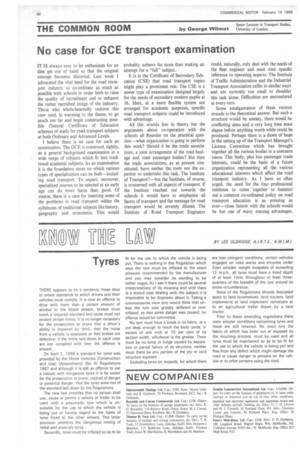No case for GCE transport examination
Page 68

If you've noticed an error in this article please click here to report it so we can fix it.
IT IS always easy to let enthusiasm for an idea get out of hand so that the original concept becomes distorted. Last week I advocated the vital need for the road transport industry to co-ordinate as much as possible with schools in order both to raise the quality of recruitment and to enhance the rather tarnished image of the industry. Those who whole-heartedly endorse this view tend, in warming to the theme, to go much too far and begin constructing possible General Certificate of Education schemes of study for road transport subjects at both Ordinary and Advanced Levels.
I believe there is no case for such an examination. The GCE is construed, rightly, as a general background examination in a wide range of subjects which fit into traditional academic subjects. As an examination it is the foundation stone on which various types of specialization can be built—including road transport. To expect, moreover. specialized courses to be selected at an early age can do more harm than good. Of course, there is a case for inserting some of the problems in road transport within the syllabuses of traditional subjects like history, geography and economics. This would probably achieve far more than making an attempt for a "full" subject.
It is in the Certificate of Secondary Education (CSE) that road transport topics might play i prominent role. The CSE is a newer type of examination designed largely for the needs of secondary modern pupils at 16. Here, in a more flexible system not arranged for academic purposes, specific road transport subjects could be introduced with advantage.
All this sounds fine in theory but the arguments about co-operation with the schools all flounder on the practical question—what organization is going to perform this work? Should it be the trade associations, a joint arrangement of the road haulage and road passenger bodies? But then the trade associations, as at present constituted, have neither the tools nor the expertise to undertake this task. The Institute of Transport?—but the Institute, of course, is concerned with all aspects of transport. If the Institute reached out towards the schools it would have to emphasize all facets of transport and the message for road transport would be severely diluted. The Institute of Road Transport Engineers could, naturally, only deal with the needs of the fleet engineer and must omit specific reference to operating aspects. The Institute of Traffic Administration and the Industrial Transport Association suffer in similar ways and are currently too small to shoulder this task alone. Difficulties are encountered at every turn.
Some amalgamation of these various strands is the theoretical answer. But such a structure would be uneasy, there would be conflicting aims and a very long time must elapse before anything worth while could be produced. Perhaps there is a dawn of hope in the setting up of the Transport Manager's Licence Committee which has brought together all the various bodies in a common cause. This body, plus bus passenger trade interests, could be the basis of a future organization representing all the various educational interests which affect the road transport industry. As I have so often urged, the need for the four professional institutes to come together to hammer out a common co-ordinated policy on road transport education is as pressing as ever—close liaison with the schools would be but one of many ensuing advantages.


















































































































